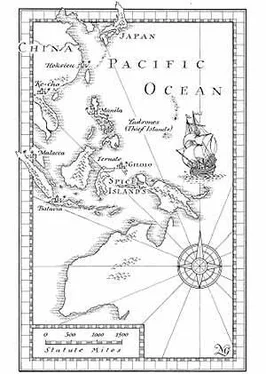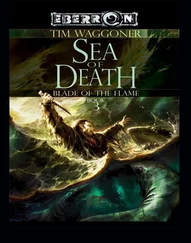‘Well, I’ve never seen any people so obliging,’ Jacques said contentedly. There was a holiday atmosphere to the day. The entire crew of the Nicholas had come ashore, leaving their muskets and cutlasses behind. They were whooping and cheering, running up and down the beach, glad to stretch their legs. A few of them cast curious glances towards the village, but as yet no one ventured in that direction. It was sufficient to enjoy the sensation of being on dry land and away from the confines of the ship.
‘Jacques, you’re wanted over here. There’s been a vegetable delivery,’ called Jezreel. He was near the cooking gear on the beach. Several more villagers had arrived with baskets on their heads and were looking around for instructions.
As Jacques hurried off, Hector became aware that the old man who had first greeted them was standing meekly just a few paces away, waiting to be noticed.
‘What is it?’ asked Hector gently. He was quietly gratified that he’d won the confidence of the village elder.
The old man bowed submissively once more and, turning, beckoned to a figure lurking half-hidden among the bamboo thickets at the back of the beach.
In most respects the person who came forward resembled the other villagers. He wore the same coarse cotton gown and, like them, he was barefoot and had narrow eyes and a yellowish skin. But his long grey hair – instead of being in a topknot – hung loose around his shoulders, and he had a straggly beard that reached to the middle of his chest. Thin-faced and spare, his weather-beaten features made it difficult to judge his age, but he must have been in his late sixties or maybe older. He lacked the diffidence of his comrade, and his dark-brown eyes were full of confident curiosity. Up close, there was something else that Hector had not observed on any of the other villagers: a faint blue mark about two inches long in the centre of his forehead. It was in the shape of a hollow, elongated lozenge and had been inked into the skin.
The village elder gave a low, apologetic cough and in his soft, tuneful language murmured something to the newcomer. Looking at Hector directly, he said slowly and carefully, ‘My name is Panu. I help. I translate.’
The accent was very strong, and Hector was so startled it took a moment for him to realize he’d been addressed in Spanish.
‘We have come here for water and rest,’ he replied.
‘Are you captain?’ Panu asked.
‘No. That is the captain over there.’ Hector pointed out Eaton standing at the campsite, talking with Arianz, the quartermaster.
‘Jeema asks you please go soon.’
Hector presumed Jeema was the village elder. ‘We will stay only a few days,’ he assured the translator.
‘Anything you need, tell Jeema. The village will try to give.’
Intrigued, Hector asked, ‘Where did you learn to speak Spanish?’
‘Know Holland more.’
For an instant Hector was baffled. Then he realized that Panu preferred to speak in Dutch. Seeing Stolck not far away, Hector called him over and, with the Hollander’s help, began to piece together Panu’s story.
He came from a small island some distance to the southwest, where once there had been a Spanish trading fort. As a child he’d learned a little Spanish from his father, who had worked as a warehouse foreman for the white foreigners. The Spaniards had suddenly abandoned the fort when Panu was in his early teens, and, a few years later, the Dutch had arrived to occupy it. They had confirmed Panu’s father in his former job, and took on Panu as his assistant.
‘What was the name of this Dutch fort?’ asked Stolck. From the Hollander’s quickened interest as he translated, Hector surmised once more that Stolck had worked for the Dutch East India Company at some time in the past.
‘Fort Keelung.’
Stolck frowned. ‘I don’t remember hearing of such a place.’
‘Perhaps it was too small. My father retired and I had taken his place as foreman when the Chinamen took over.’
Stolck’s brow cleared. ‘Now I remember. The Company had a small fort on one of the little islands to the north of Formosa. One year it ceased to exist, and I never heard what happened to it.’
‘The Chinamen drove out the Dutch.’
‘What happened to you?’ asked Hector through Stolck.
Panu seemed to retreat into himself as if shrinking from a painful memory. ‘I tried to cling on to my job. My father was already an old man and he was killed in the fighting. Later I lost my family and my home when the town was burned to the ground.’
‘And what brought you here?’
Panu made a grimace of resignation. ‘I was useful to the Chinese because I spoke the languages of commerce. Sometimes they needed me to go on their junks that traded with Japan.’
‘That’s impossible,’ said Stolck to Hector, and then translated for Panu. ‘The Japanese forbid any trade with China.’
Panu gave him a weary look. ‘There is always smuggling. The Chinese junks did not sail to Japan itself. They came here, to these islands, and dealt with the Japanese merchants through intermediaries. It was very profitable for both sides.’
‘So you can speak some Japanese as well?’ Hector asked. He was impressed by the man’s calm competence, though there was an undercurrent of real sadness.
A look of caution crossed Panu’s face. ‘The villagers took me in when I chose to desert the China merchants. I have been able to make myself useful.’
Hector turned to Stolck. ‘That settles where we are. This island lies somewhere between Japan and Formosa. It’s not marked on my chart, but, equally, it’s not Cipangu.’
Stolck refused to let his hopes be dashed so easily. ‘Tell me,’ he said, speaking directly to Panu, ‘where do the villagers obtain the gold on their hair pins?’
The interpreter relayed his question to the village elder, who had stood there patiently, and all of a sudden Jeema looked more frightened than ever. He shook his head and muttered a short, unhappy-sounding answer.
‘He says this is not a fit question. The Ta-yin decides who can wear a golden sign and he distributes the emblem.’
A spark of suspicion lit up Stolck’s eyes. ‘He is dodging the question,’ he grunted. ‘Who is this Ta-yin?’
Panu looked at him steadily. ‘In the language of these people it means “the great man”. He gives out the pins, and decides who shall receive them. A gold pin is a symbol of authority. Jeema here is the leader of the village council.’
‘And where is this Ta-yin now?’
Panu did not consult the village elder before answering. ‘No one ever knows when the Ta-yin will arrive, or how long he will stay. He is the master.’
Jeema edged away, looking increasingly ill at ease, as if he did not wish to hear any more of this discussion. Now he bowed once more, then scurried off down the beach at a half-run. A string of empty water barrels had been towed ashore from the Nicholas , and he joined his fellow villagers in helping to roll them up the sand.
Hector strolled over to Jacques, who was still sorting through the food baskets delivered by the villagers. For the most part the fruits and vegetables were familiar. He recognized onion, sugar cane, coconut and papaya, though the sweet potatoes had an unusual purple colour. The Frenchman held up a long, green vegetable the shape of a cucumber, but with a spiky skin.
‘What do you think this is?’ he said, cutting off a slice and offering it.
Hector nibbled the sample cautiously. ‘Tastes like melon.’
Jacques surveyed the array of baskets with a gleam in his eye. ‘I’m going to enjoy cooking with all this,’ he gloated. He picked out an ugly, rough, knobbly object like a misshapen potato with a pale-brown skin, and broke it in half. The flesh inside was a vivid orange-yellow. He sniffed the exposed end and gave a sigh of satisfaction.
Читать дальше








